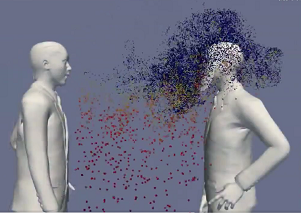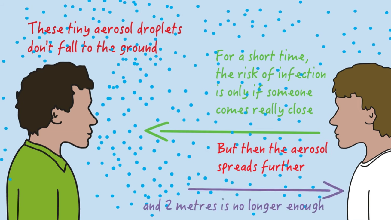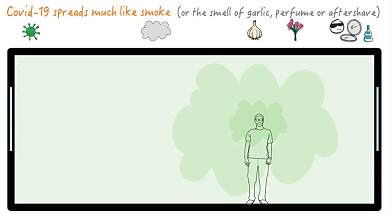How COVID Spreads
COVID moves through the air in tiny bits of moisture called aerosols from a contagious person. We release aerosols when we sneeze, cough, talk, or even breathe. You get COVID by breathing them in. The more virus you breathe in, the more likely you are to get sick.
Quick Info
There are two ways:
Check the CDC's COVID County Check widget. It tells you the COVID Community Level, which takes into account how many cases of COVID there are in your area and how many people with COVID are in the hospital. If you plug in your state and county, it will tell you what your county's level is and give you basic instructions on what to do.
If you're at high risk of getting very sick with COVID, you may want to know more details. In that case, go to the CDC's COVID-19 Integrated County View page. If you click on "Transmission Levels" in the yellow section near the top of the page, you can see maps that tell you how much COVID is spreading in your area. You can also see the COVID Community Levels there, plus lots of other info.

The closer you are to someone who has COVID, the more of their breath reaches you. This animation from RIKEN Japan (screenshot above) shows how that works.
The more of their breath you breathe in, the bigger the dose of virus you get.

We know now that COVID can travel a lot farther than 6 feet, especially indoors.
We also know it can stay in the air for a long time, especially in places without a lot of fresh air. This animation from the University of Oxford shows how it works. (Animation by Vicki Martin, screenshot above)
So, the longer you spend in a room with a person who has COVID, the more likely you are to breathe in enough virus to make you sick.

COVID moves through the air like smoke. When the windows are open, you breathe in less. This animation from the University of Oxford shows how that works. (Animation by Vicki Martin, screenshot above)
That’s why it's riskier to spend time in places that don't have as much fresh air, like bars or cramped stores.
Places where people shout or breathe hard, like nightclubs or gyms, add risk, as well.
If you’re up to date on your vaccines, you're less likely to get infected. Remember that being up to date includes getting all recommended boosters.
If you're not infected, you can't spread the virus.
Washing your hands is a great way to help keep yourself from getting sick.
It's especially important to wash after you've been in a public place and before you eat.
Avoiding touching your eyes or nose helps, too. If you have virus on your hands, it can get into your body that way.
However, COVID infections usually come from breathing in air that has virus in it. That's why — for COVID — these tools are more important than hand-washing:
Wearing masks.
Staying away from places with lots of people.
Avoiding places that don't have a lot of fresh air.
Articles
WhenToTest — For COVID and Flu
At-home combination COVID and flu tests are almost here. WhenToTest is ready to help you use them.
Don’t Feel Like Getting Sick This Winter? Here’s One Weird Trick
There’s this cool thing that can really help keep you from getting the flu, a cold, or even COVID! It’s called a mask.
Reading Roundup: Respiratory Virus Season
Here are our picks for the articles and status updates that will keep you informed this fall and winter.
Going Back to the Office — For Real This Time
How my partner tries to dodge COVID now that she’s been forced back in.
Keep Kids in School by Keeping the Air Clean
Use these tips and tools to help keep kids learning this fall and winter.
Accessible Tests and Why You Should Care
Many design improvements that could make COVID tests more accessible for people with disabilities will make them easier to use for all of us.
Time to Get the Flu Vaccine
The flu season may come early again this year. The time to protect yourself is now.
We're Still Not Done With COVID...Here's Why!
Even though the virus is under control to some degree, there is still a lot of important work happening to understand and improve how we manage it.
EUAs: The Beginning and The End
Emergency Use Authorizations (EUAs) gave us COVID tests quickly. What happens to them when the emergency is over?
